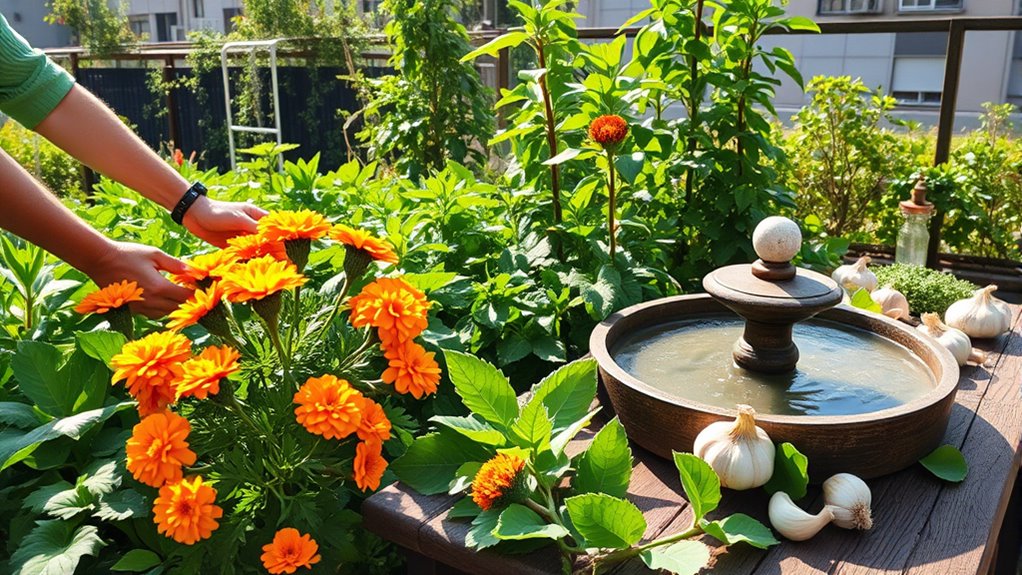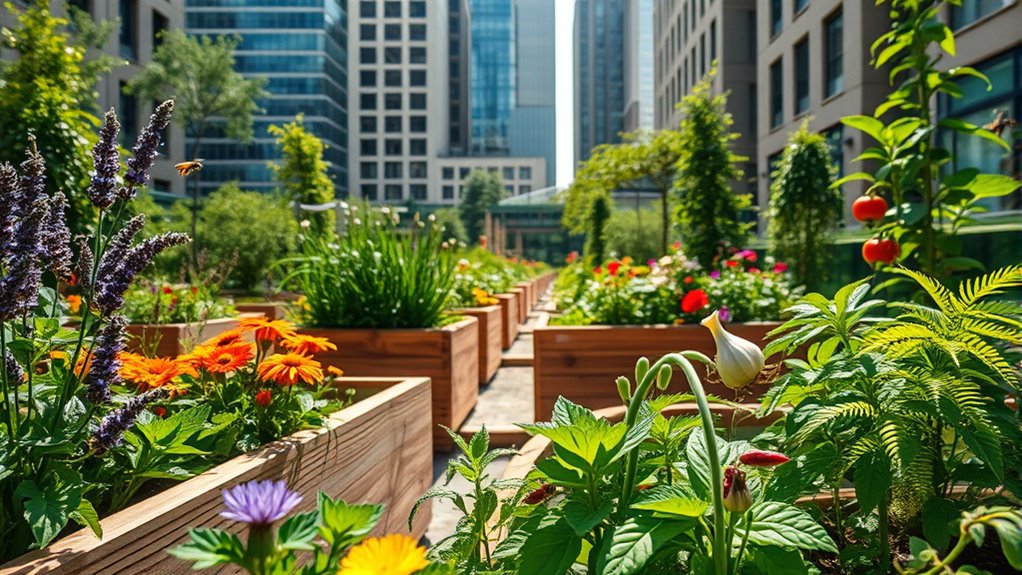To prevent pests naturally in your urban garden, try companion planting by grouping certain plants like marigolds and basil to deter pests and attract beneficial insects. Use organic barriers such as row covers or mesh screens to physically block pests while letting sunlight and water through. Combining these methods creates a resilient, pest-resistant ecosystem that minimizes chemical use. Keep exploring to discover more effective, eco-friendly ways to protect your garden and keep it thriving.
Key Takeaways
- Use companion planting, like marigolds and basil, to naturally repel pests and attract beneficial insects.
- Incorporate organic barriers such as row covers and mesh screens to physically block pests.
- Select pest-resistant plant varieties to reduce vulnerability and minimize pest problems.
- Combine physical barriers with companion planting for layered, effective pest prevention.
- Regularly inspect and adjust barriers, and rotate companion plants to maintain garden health and pest resistance.

Are pests ruining your urban garden? If you’re tired of battling insects and other unwanted visitors while trying to grow healthy plants, it’s time to explore natural solutions that work with your environment. One effective way to keep pests at bay is through companion planting, a technique that involves growing certain plants together to repel pests or attract beneficial insects. For example, planting marigolds near your tomatoes can deter nematodes and aphids, while basil near peppers can confuse pests and reduce their interest in your crops. Companion planting isn’t just about repelling pests; it also promotes healthier soil, improves plant growth, and maximizes space, making it ideal for limited urban gardens. Additionally, choosing the right plants can enhance pest resistance naturally, reducing the need for interventions.
Combat urban pests naturally with companion planting that enhances growth and maximizes limited space.
Alongside companion planting, organic barriers are a practical method to physically block pests from reaching your plants. These barriers can be simple or elaborate, depending on your space and needs. Row covers, for instance, are lightweight fabrics that prevent insects from accessing your plants while still allowing sunlight and water to pass through. You can also use mesh screens around vulnerable plants or create collars from cardboard or plastic around the base of seedlings to stop crawling pests like cutworms or slugs. Organic barriers are particularly appealing because they don’t involve chemicals and can be easily moved or adjusted as your garden grows or as pest threats change.
Using companion planting and organic barriers together offers a layered defense, reducing the need for chemical pesticides that can harm beneficial insects and pollute your urban environment. By carefully selecting plants that naturally repel pests, you create a protective ecosystem that encourages beneficial insects like ladybugs and lacewings to thrive. These natural predators help keep pest populations under control without the need for intervention. Applying organic barriers further enhances this system by physically excluding pests, especially during vulnerable stages of plant growth.
In an urban setting, space is limited, making these natural solutions even more valuable. They’re cost-effective, environmentally friendly, and easy to implement, allowing you to maintain a healthy garden without relying on harsh chemicals. Regularly rotating your companion plants and inspecting your barriers ensures your pest prevention strategy stays effective. Over time, you’ll notice fewer pest problems and healthier plants, all while supporting your city’s environment. Embracing these natural methods can transform your urban garden into a resilient, thriving oasis free from pest damage, giving you fresh, organic produce and the satisfaction of sustainable gardening.
Frequently Asked Questions
Are DIY Natural Pest Repellents Safe for Children and Pets?
When considering DIY natural pest repellents, you’re right to prioritize child safety and pet protection. Many homemade remedies use ingredients like garlic or neem oil, which are generally safe if used correctly. However, always research each ingredient’s safety, keep repellents out of children’s and pets’ reach, and test small areas first. Proper application guarantees you effectively protect your garden while keeping your loved ones safe.
How Often Should I Apply Natural Pest Control Methods?
You should adjust your application frequency based on seasonal timing and pest activity. During peak pest seasons, apply natural pest control methods more frequently, perhaps every 7 to 10 days. In off-peak times, reduce the frequency to every 2-3 weeks. Keep an eye on your plants and pests, and adapt your routine accordingly. Consistent monitoring and timely applications help maintain a healthy, pest-free urban garden.
Can Natural Solutions Completely Eliminate Pests From My Urban Garden?
Natural solutions can’t completely eliminate pests, but they substantially reduce their impact. You can use biological controls like beneficial insects and practice companion planting to deter pests. These methods work together to create a balanced ecosystem, lowering pest populations naturally. While you might not eradicate every pest, combining these strategies helps keep your urban garden healthier and more sustainable, making pests less of a problem over time.
Do Natural Pest Control Methods Harm Beneficial Insects?
Imagine you’re using neem oil in your garden, wondering if it harms beneficial insects. Generally, natural pest control methods like neem oil are designed to target specific pests, minimizing non-target species impact. However, some methods can unintentionally affect beneficial insect preservation if misapplied. You should always follow instructions carefully, as improper use might harm helpful insects like pollinators, risking disruption of your garden’s natural balance.
Are Organic Pesticides More Effective Than Chemical Ones?
You might wonder if organic pesticides are more effective than chemical ones. Organic options often promote better plant health and reduce pest resistance over time, making them a smarter choice for sustainable gardening. While chemical pesticides may work quickly, they can harm beneficial insects and disrupt ecological balance. Organic solutions, though sometimes slower, support healthier plants and a balanced ecosystem, ultimately leading to more resilient pest control in your urban garden.
Conclusion
By embracing natural pest prevention methods, you turn your urban garden into an unstoppable fortress against pests. With these eco-friendly solutions, you’re not just protecting your plants—you’re transforming your garden into a thriving oasis that outshines even the most lavish landscapes. Remember, your efforts are more powerful than a hurricane, making pests flee in terror. Keep nurturing your garden with these natural strategies, and watch it flourish into a vibrant, pest-free paradise you can truly be proud of.









